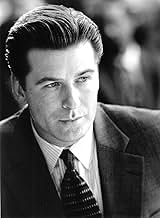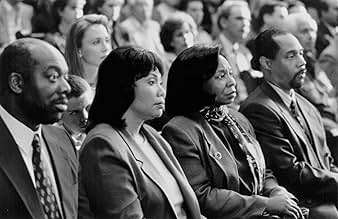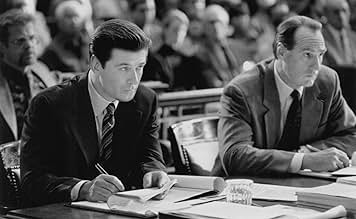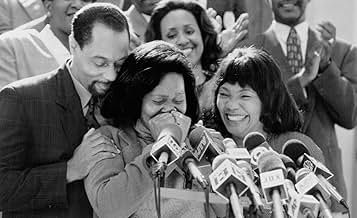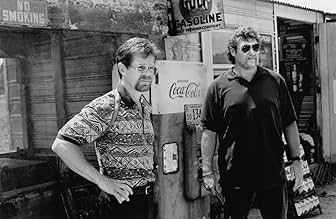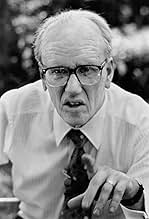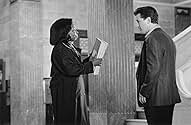AVALIAÇÃO DA IMDb
6,7/10
13 mil
SUA AVALIAÇÃO
Um promotor distrital do Mississippi e a viúva de Medgar Evers lutam para finalmente levar um racista branco à justiça pelo assassinato do líder dos direitos civis em 1963.Um promotor distrital do Mississippi e a viúva de Medgar Evers lutam para finalmente levar um racista branco à justiça pelo assassinato do líder dos direitos civis em 1963.Um promotor distrital do Mississippi e a viúva de Medgar Evers lutam para finalmente levar um racista branco à justiça pelo assassinato do líder dos direitos civis em 1963.
- Direção
- Roteirista
- Artistas
- Indicado a 2 Oscars
- 2 vitórias e 9 indicações no total
Joe Tello
- Drew DeLaughter
- (as Joseph Tello)
Alexa PenaVega
- Claire DeLaughter
- (as Alexa Vega)
Ben Bennett
- Benny Bennett
- (as Lloyd 'Benny' Bennett)
Avaliações em destaque
Based on fact and directed by Rob Reiner, Ghosts recounts the investigation, and retrial in 1994 - after two mistrials in the 60s - of Byron de la Beckwith for the racist shooting in 1963 of Medgar Evers, an NAACP activist. The film has gained renewed topicality with the recent conviction of another white supremacist for the Birmingham, Alabama, Baptist Church bombing, also in 1963.
Alec Baldwin gives a solid, and sometimes stolid, performance in the central role of prosecuting DA, Bobby DeLaughter (pronounced DeLaw), himself from Mississippi's white uppercrust, whose marriage hits the rocks because of his pursuit of the case. James Woods, convincingly made up to look over 70 for most of the movie, is electrifying as the arrogant, hateful Beckwith. Whoopi Goldberg portrays Medgar's widow with a lot of dignity and even a touch of humour, but it would have been understandable if she had also displayed a little more bitterness.
The movie is possibly not as powerful as Reiner hoped, partly no doubt because he was restricted by the facts. In particular, the retrial seems to have thrown up little or no new evidence, thus making the courtroom action less dramatic than in a fictional movie. Perhaps a greater criticism is that the intense focus on Baldwin/DeLaughter, who is in almost every scene, tends to turn him into the hero of the movie; whereas it should be Medgar Evers, who as a civil rights activist in one of the most bigoted areas of the USA deserves everyone's undying admiration.
Despite the movie's flaws, it is gripping for most of its 130 minutes, and this was certainly a story worth telling.
Alec Baldwin gives a solid, and sometimes stolid, performance in the central role of prosecuting DA, Bobby DeLaughter (pronounced DeLaw), himself from Mississippi's white uppercrust, whose marriage hits the rocks because of his pursuit of the case. James Woods, convincingly made up to look over 70 for most of the movie, is electrifying as the arrogant, hateful Beckwith. Whoopi Goldberg portrays Medgar's widow with a lot of dignity and even a touch of humour, but it would have been understandable if she had also displayed a little more bitterness.
The movie is possibly not as powerful as Reiner hoped, partly no doubt because he was restricted by the facts. In particular, the retrial seems to have thrown up little or no new evidence, thus making the courtroom action less dramatic than in a fictional movie. Perhaps a greater criticism is that the intense focus on Baldwin/DeLaughter, who is in almost every scene, tends to turn him into the hero of the movie; whereas it should be Medgar Evers, who as a civil rights activist in one of the most bigoted areas of the USA deserves everyone's undying admiration.
Despite the movie's flaws, it is gripping for most of its 130 minutes, and this was certainly a story worth telling.
Impressive drama about the assassination of 1960's civil rights leader Medger Evers, which was fought in courts for 30 years until it was re-opened in the 1990's with Mississippi D.A. Bobby DeLaughter (Baldwin) leading the charge to bring assassin Byron De Lay Beckwith (Woods, in a juicy Oscar nominated role) to justice. Goldberg is especially standout as Ever's widow who fought for the truth for over 30 years. Rob Reiner's film may run a little long for some, but the excellent cast and realistic story will keep you glued until the end.
This movie tells a fascinating piece of our history, how one man could escape justice for so long. It was very moving to see how he was eventually brought to justice.
Part of what made this a good movie was the way it didn't doctor the facts to make them more acceptable to a film audience. They stick to true history, and the most outrageous details in the film were true. (Particularly the detail of how the gun was found.) I like a film that respects an audience enough to tell the real history.
Part of what made this a good movie was the way it didn't doctor the facts to make them more acceptable to a film audience. They stick to true history, and the most outrageous details in the film were true. (Particularly the detail of how the gun was found.) I like a film that respects an audience enough to tell the real history.
THIS FILM IS BASED ON A TRUE STORY. Not only was the real Myrlie Evers consulted while making the film, two of her and Medgar's sons were actually in the film, playing themselves. Benny Bennett also played himself.
It was based on a actual (although little known) event in American history, and shows how there are still conflicts over civil rights today. We also learn that there are still some people in the Southern U.S. that are opposed to laws that have been in place for over 35 years.
So while watching this you shouldn't think "the story is cliche" or "the acting was good, but predictable," you should be thinking that this actually happened, and reflecting on how far we've come as a society, and how far we still need to go.
It was based on a actual (although little known) event in American history, and shows how there are still conflicts over civil rights today. We also learn that there are still some people in the Southern U.S. that are opposed to laws that have been in place for over 35 years.
So while watching this you shouldn't think "the story is cliche" or "the acting was good, but predictable," you should be thinking that this actually happened, and reflecting on how far we've come as a society, and how far we still need to go.
Medgar Evers' tragic murder in Jackson, Mississippi, was overshadowed by the cold-blooded killing of three civil rights workers near Philadelphia, Mississippi, a year later. So too this film has been overshadowed by an earlier movie, "Mississippi Burning," about the Philadelphia homicides. I was even confused by the similar titles and accidentally rented "Ghosts of Mississippi," thinking it to be the earlier film. This is too bad because "Ghosts of Mississippi" is a winner all the way and Medgar Evers' assassination was as significant, if not more so, than the later dastardly acts of hate and malevolence.
Most of my generation remember one of Dylan's early recordings he wrote called "Pawn in the Game" about the Medgar Evers murder in which Dylan asserts that the coward who pulled the trigger and shot the civil rights leader in the back in front of his wife and three children was carrying out what the racist elements in Mississippi and in the nation as a whole had brainwashed the simple mind into executing. That the endemic racism in American was the real perpetrator of the heinous deed which deprived our society of one of its gifted leaders. "Ghosts of Mississippi" concentrates more on the scumbag who squeezed the trigger, played with élan by James Woods, almost a carbon copy of the killer in both speech, mannerisms, and looks.
James Woods is a member of a strong cast led by Whoopi Goldberg as the widow, Myrlie Evers, spending her life seeking a degree of justice for her husband and children. William H. Macy adds much needed humor in the role of Charlie Crisco, a member of the prosecution team. Unfortunately, his part is mainly limited to the middle section of the movie. Why director Rob Reiner and writer Lewis Colick decided to turn Macy's character into a cameo during the latter part of the film is unclear.
A subplot in the film is the growing involvement of prosecutor Bobby DeLaughter (Alec Baldwin) in the case, opening his eyes not only to the past evils of the society in which he lives but also hostile residue left by the civil rights movement in the state. Married to the daughter of one of Mississippi's most racist judges causes him to be blind to much of the injustice prevalent around him. Significantly, his wife is named Dixie (Virginia Madsen). The change that takes place in his character (which also involves a change in wives) as he is drawn deeper into the thirty-year-old case is pinpointed by his inability to continue to sing "Dixie" to his daughter to chase away the ghosts she sees at night. In explaining to her that the song might actually be encouraging the ghosts to reappear in her bedroom, the two opt for "Old McDonald" as a more suitable goodnight song.
Most of my generation remember one of Dylan's early recordings he wrote called "Pawn in the Game" about the Medgar Evers murder in which Dylan asserts that the coward who pulled the trigger and shot the civil rights leader in the back in front of his wife and three children was carrying out what the racist elements in Mississippi and in the nation as a whole had brainwashed the simple mind into executing. That the endemic racism in American was the real perpetrator of the heinous deed which deprived our society of one of its gifted leaders. "Ghosts of Mississippi" concentrates more on the scumbag who squeezed the trigger, played with élan by James Woods, almost a carbon copy of the killer in both speech, mannerisms, and looks.
James Woods is a member of a strong cast led by Whoopi Goldberg as the widow, Myrlie Evers, spending her life seeking a degree of justice for her husband and children. William H. Macy adds much needed humor in the role of Charlie Crisco, a member of the prosecution team. Unfortunately, his part is mainly limited to the middle section of the movie. Why director Rob Reiner and writer Lewis Colick decided to turn Macy's character into a cameo during the latter part of the film is unclear.
A subplot in the film is the growing involvement of prosecutor Bobby DeLaughter (Alec Baldwin) in the case, opening his eyes not only to the past evils of the society in which he lives but also hostile residue left by the civil rights movement in the state. Married to the daughter of one of Mississippi's most racist judges causes him to be blind to much of the injustice prevalent around him. Significantly, his wife is named Dixie (Virginia Madsen). The change that takes place in his character (which also involves a change in wives) as he is drawn deeper into the thirty-year-old case is pinpointed by his inability to continue to sing "Dixie" to his daughter to chase away the ghosts she sees at night. In explaining to her that the song might actually be encouraging the ghosts to reappear in her bedroom, the two opt for "Old McDonald" as a more suitable goodnight song.
Você sabia?
- CuriosidadesYolanda King, the daughter of civil rights activist Martin Luther King, portrayed Medgar Evers' daughter Reena Evers in this film.
- Erros de gravaçãoWhen DeLaughter and his investigators drive up to a gas station, the prices for gas are all under a dollar. When DeLaughter is on the phone to Myrlie Evers standing on the other side of the signs, the prices are all now over a dollar.
- Citações
Myrlie Evers: [quoting Medgar Evers] When you hate, the only person who suffers is you, because most of the people you hate don't know it and the others don't care.
- Trilhas sonorasI Wish I Knew How It Would Feel to Be Free
Music by Billy Taylor
Lyrics by Billy Taylor and Dick Dallas
Performed by Dionne Farris
Courtesy of Columbia Records
By Arrangement with Sony Music Licensing
Principais escolhas
Faça login para avaliar e ver a lista de recomendações personalizadas
- How long is Ghosts of Mississippi?Fornecido pela Alexa
Detalhes
- Data de lançamento
- País de origem
- Idioma
- Também conhecido como
- Ghosts of Mississippi
- Locações de filme
- Empresas de produção
- Consulte mais créditos da empresa na IMDbPro
Bilheteria
- Orçamento
- US$ 36.000.000 (estimativa)
- Faturamento bruto nos EUA e Canadá
- US$ 13.323.144
- Fim de semana de estreia nos EUA e Canadá
- US$ 168.012
- 22 de dez. de 1996
- Faturamento bruto mundial
- US$ 13.323.144
- Tempo de duração
- 2 h 10 min(130 min)
- Cor
- Mixagem de som
- Proporção
- 1.85 : 1
Contribua para esta página
Sugerir uma alteração ou adicionar conteúdo ausente


